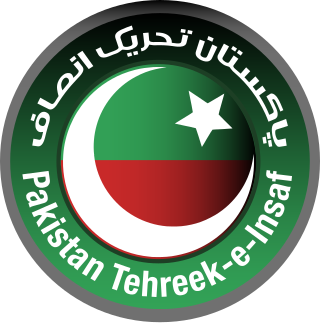
The Pakistan Tehreek-e-Insaf is a political party in Pakistan. It was founded in 1996 by Pakistani cricketer-turned politician Imran Khan, who served as the country's prime minister from 2018 to 2022. The PTI is one of the three major Pakistani political parties alongside the Pakistan Muslim League–Nawaz (PML–N) and the Pakistan People's Party (PPP), and it is the largest party in terms of representation in the National Assembly of Pakistan since the 2018 general election. With over 10 million members in Pakistan and abroad, it claims to be the country's largest political party by primary membership as well as one of the largest political parties in the world.
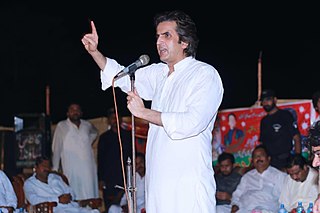
Makhdum Khusro Bakhtyar is a Pakistani politician who recently served as Pakistan's Federal Minister for Industries & Production. Previously, he has served as Federal Minister of Economic Affairs, Federal Minister of National Food Security and Research and Federal Minister for Planning, Development and Reforms in the PTI Government under the leadership of Prime Minister Imran Khan. He had been a member of the National Assembly of Pakistan from 2002 to 2008, 2013 to 2018 and 2018 till 2023.
Raja Riaz Ahmad is a Pakistani politician who had been a member of the National Assembly of Pakistan from August 2018 till August 2023. Previously, he was the Punjab Minister for Irrigation and Power and was also the member of the Provincial Assembly of the Punjab between 1993 and 2013. He had been leader of opposition in the National Assembly of Pakistan from May 2022 till August 2023.
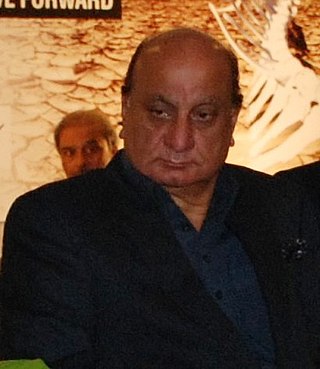
Muhammad Basharat Raja(Punjabi:محمد بشارت راجہ) is a Pakistani politician who was the Provincial Minister of Punjab for Law and Parliamentary Affairs and Provincial Minister of Punjab for Baitul Maal and Social Welfare. He had been a member of the Provincial Assembly of the Punjab from August 2018 till January 2023. He is the son of former Member of the National Assembly of Pakistan Raja Laal of Rawalpindi.
Mian Ghulam Sarwar Khan is a Pakistani politician who was the former Federal Minister for Aviation, in office from 24 May 2019 to 10 April 2022. Prior to this position, he was appointed as Federal Minister for Petroleum on 20 August 2018, but he was shifted to the Aviation Ministry. He had been a member of the National Assembly of Pakistan, from August 2018 till January 2023. Previously, he was a member of the National Assembly from 2002 to 2007 and again from June 2013 to May 2018. He remained a member of the Provincial Assembly of the Punjab from 1985 to 1996. Then he

General elections were held in Pakistan on Saturday 11 May 2013 to elect the members of the 14th National Assembly and the four Provincial Assemblies. The three major parties were the Pakistan Muslim League (N) (PML-N) led by Nawaz Sharif, the Pakistan People's Party (PPP) led by President Asif Ali Zardari and the Pakistan Tehreek-e-Insaf (PTI) led by Imran Khan. Prior to the elections, the ruling PPP formed an alliance with the Pakistan Muslim League (Q) and Awami National Party, while the main opposition party, the PML-N allied with the Pakistan Muslim League (F) and Baloch parties. The PTI led by cricketer-turned-politician Imran Khan, also emerged as a key-player.

General elections were held in Pakistan on Wednesday, 25 July 2018 to elect the members of 15th National Assembly and the four Provincial Assemblies. The three major parties were Pakistan Tehreek-e-Insaf (PTI) led by Imran Khan, the Pakistan Muslim League led by Shehbaz Sharif and the Pakistan Peoples Party led by Bilawal Bhutto. The PTI won the most seats in the National Assembly but fell short of a majority; the party subsequently formed a coalition government with several smaller parties. At the provincial level, the PTI remained the largest party in Khyber Pakhtunkhwa (KP); the Pakistan Peoples Party (PPP) retained its dominance in Sindh and the newly formed Balochistan Awami Party (BAP) emerged as the largest party in Balochistan. In Punjab, the result was a hung parliament with the Pakistan Muslim League (N) (PML-N) winning the most seats. However, after several independents MPAs joined the PTI, the latter became the largest party and was able to form a government.

Sardar Ayaz Sadiq is a Pakistani politician who had been a member of the National Assembly of Pakistan from August 2018 till August 2023. Previously, he was a member of the National Assembly from 2002 to May 2018. He served as the 19th Speaker of the National Assembly of Pakistan from June 2013 to August 2015 and again from November 2015 to August 2018. Sadiq chaired the Parliament Session in April 2022 on the day of No confidence motion against Imran Khan, and conducted in house voting for the New Prime Minister, later Shehbaz Sharif was elected as new Prime Minister on April 11th, 2022.
Sardar Mansab Ali Dogar is a Pakistani politician who had been a member of the National Assembly of Pakistan, from 2008 to May 2018.

Presidential elections were held in Pakistan on 4 September 2018. The elections saw Arif Alvi of PTI being elected as the 13th President of Pakistan after defeating Fazal-ur-Rehman of MMA and Aitzaz Ahsan of PPP. Although the incumbent President Mamnoon Hussain, whose term was to expire on 9th September 2018, was eligible for re-election, he declined to take part.
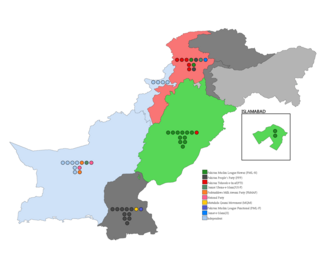
The triennial Senate Electionsof Pakistan were held on 3 March 2018 to replace 52 retiring senators - half of the Senate's strength - with the winning candidates serving six-year terms. Overall, Pakistan Muslim League (N) came out as the largest party, followed by the Pakistan Peoples Party and the Pakistan Tehreek-e-Insaf. The results of these elections were steeped in controversy due to rampant allegations of horse trading and vote-buying, which lead to the Prime Minister and opposition leader Imran Khan calling for reforms. Prior to this election, PML (N) candidates were declared as independents by the Election Commission of Pakistan owing to a Supreme Court judgment.
Abdul Aleem Khan is a Pakistani politician and a business tycoon. Abdul Aleem Khan owns Samaa TV and Vision Group. He was also the Senior Minister of Punjab and Minister of Food from 2020 to 2021. He also served as a member of the Provincial Assembly of the Punjab from August 2018 to 2021. He announced his separation from politics on Twitter in a tweet. Later in a statement to the media, he said that he has no intentions of joining politics. He also said that his current focus is on the welfare work he has been doing through the Abdul Aleem Khan Foundation to bring prosperity and comfort to the most neglected segment of society. Mr. Abdul Aleem Khan once again stepped into the world of politics in the year 2023 with the aim of bringing Pakistan out of the whirlpool of problems that have been surrounding it. Abdul Aleem Khan along with others founded a new party called the Istehkam-e-Pakistan party and was appointed the president of the party on June 12, 2023.

Provincial elections were held in the Pakistani province of Punjab on to elect the members of the 17th Provincial Assembly of the Punjab on 25 July 2018, alongside nationwide general elections and three other provincial elections in Sindh, Balochistan and Khyber Pakhtunkhwa. The remaining two territories of Pakistan, AJK and Gilgit-Baltistan, were ineligible to vote due to their disputed status.

Fawad Ahmed Hussain Chaudhry is a former Pakistani politician and a former senior member of Pakistan Tehreek-e-Insaf, who was Federal Minister for Information and Broadcasting, in office since 14 April 2021 to 10 April 2022. He parted ways with Imran Khan and the PTI on 24 May 2023 announcing he was leaving politics.

The 2023 Karachi local government elections were held in Karachi, Pakistan on 15 January 2023 to elect members of local councils. These members would then elect the Mayor of Karachi (2023-2027). These elections were the 3rd Karachi local government elections.
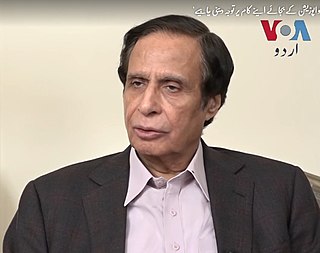
By-elections were held in Punjab, Pakistan on 17 July 2022 to elect 20 members of the Provincial Assembly of the Punjab. The Pakistan Tehreek-e-Insaf won a landslide victory on 15 of those 20 seats, leading to the collapse of Chief Minister Hamza Shahbaz's PML(N)-led coalition government, as it became 7 seats short of a majority.

Provincial elections were scheduled to be held in the Pakistani province of Punjab in May 2023, according to the Supreme Court of Pakistan's most recent judgement, to elect a new provincial legislature.

Provincial elections are scheduled to be held in the Pakistani province of Khyber Pakhtunkhwa on 8 October 2023 to elect a new provincial legislature. This date is subject to change due to a case in the Supreme Court.
The 2022–2023 Pakistan political unrest is an ongoing series of political crises after the ousting of former Prime Minister Imran Khan through a no-confidence motion in April 2022. The crises began in 2022 when the opposition joined hands and submitted a no-confidence motion against Imran Khan's government in the National Assembly. Prime Minister Imran Khan urged the Pakistani establishment not to stay neutral and play its role to save his government and not let historical rival politicians with alleged corruption charges take over, but the establishment refused.


















